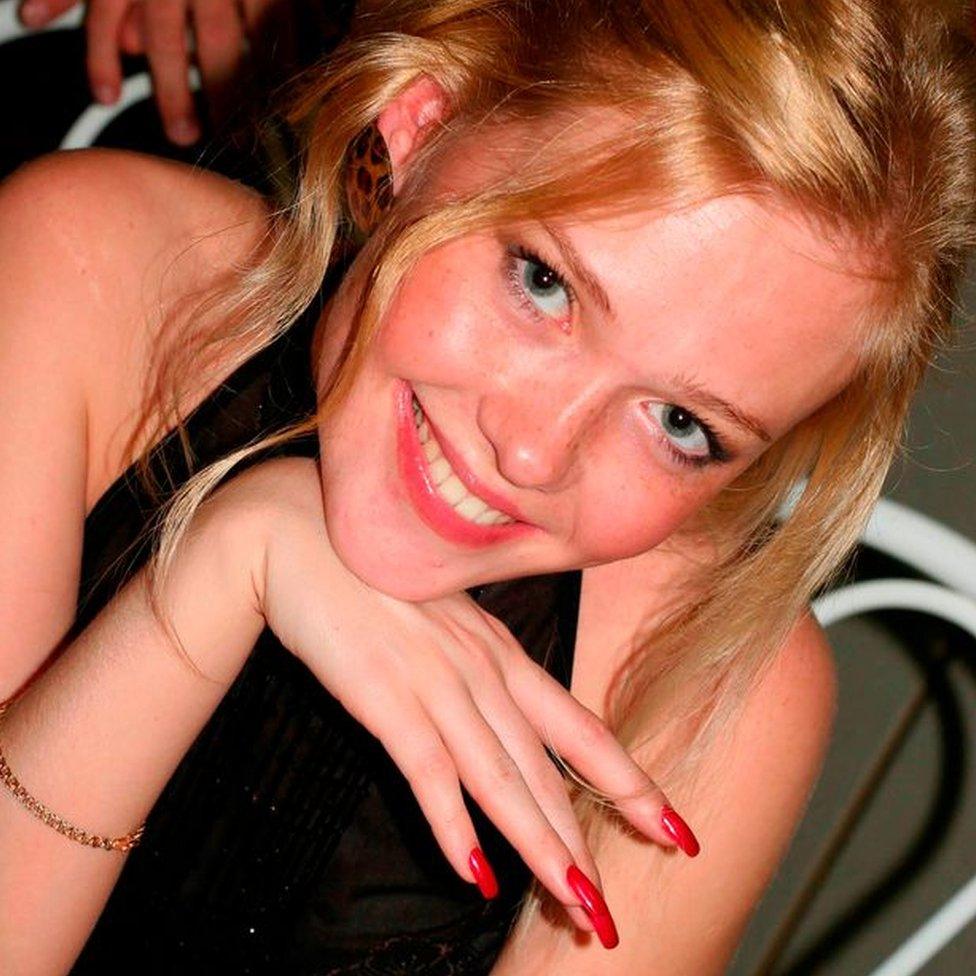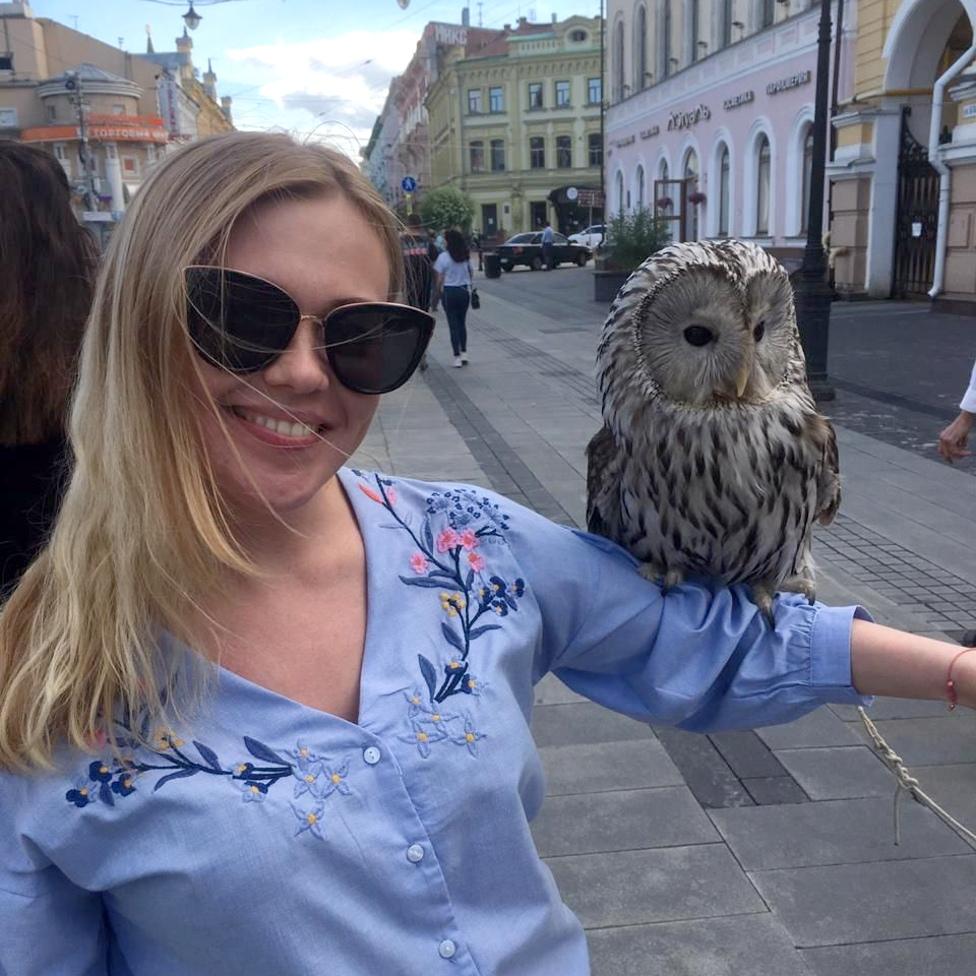A tale of two femicides - and media bias
- Published

Alexandra Inshina
The media prefers some female murder victims to others - one killing gets blanket coverage, while another is quickly dismissed. But crimes of femicide - when a woman is killed because of her gender - may at least be counted more accurately, if the UN can persuade countries to use a new, expanded framework for identifying cases.
Alexandra
On 5 Jun 2021, the day before she was murdered, Alexandra Inshina told her friend that she was in love.
That Saturday afternoon, as she sunbathed with her friend Yulia by a lake in Beryozovsky, a small town east of the Ural Mountains in Russia, Alexandra was excited. It had been a few years since her divorce and Alexandra had settled into life as a 35-year-old single mother to a 10-year-old boy. There was much to be happy about. She was already a team leader at the car parts factory where she worked, and two days earlier, she had booked a holiday in Egypt for her and her son.
And now the fizz of new love. A man from the nearby city of Yekaterinburg, whom she would be meeting for a date that evening, was making life a little bit more interesting.
As she spoke, her phone vibrated with a text message. It was him but it wasn't good news. He wasn't sure he would be free, after all. The text seemed like a brush-off.
"She was upset by it," Yulia says. The women stayed by the lake together, talking about the unreliability of men, until eight in the evening when they left for their respective homes, promising to check in with each other, as usual, the following day. Alexandra returned to an empty flat, as her son was spending the weekend with her parents.
Later, Alexandra made a decision. She would go to Yekaterinburg after all, to an English-themed all-night pub, the Rosy Jane. At 01:30 she ordered a taxi. CCTV footage shows that by 03:00 she was at the pub, alone. Alexandra texted her boyfriend inviting him to join her.
What is femicide?
Femicide is defined by the World Health Organization as "the murder of women because they are women" and by the UN as "the gender-related killing of women and girls"
Eighteen countries in Latin America and the Caribbean have adopted specific laws making femicide a criminal offence
In many other countries the word is not widely used, but is increasingly being adopted by campaigners against gender-based violence
"I'm such a moron," he later told Yulia, devastated with guilt. "I didn't reply."
At 05:00 Alexandra left, and was approached by a man in a car who was moonlighting as a taxi driver. At first she refused to get in, CCTV pictures show, then changed her mind.
"I think by that time maybe she was tired. She just wanted to get home," says Yulia.
Thirty minutes later Alexandra Inshina had been stabbed six times, her hands tied behind her back. It would be two days before her body was discovered among nettles and bushes in woods about 25 miles away.
"What a terrible, hateful death," another friend, Marina, tells the BBC.
Olga
Six years before she was killed, Olga told friends that she wanted to be on TV.
She was 21 and glamorous, and had just moved to Russia's capital from the western city of Bryansk, leaving her daughter, whom she'd had as a teenager, in her mother's care.
In Moscow, Olga attracted admirers. She did some part-time modelling and experimented with her look, dying her naturally dark hair blonde. She told her neighbour, Dmitry, that she wanted to be on Dom-2, a reality TV show based on Big Brother.

Olga's friends say she was great with children and dreamed of becoming a TV star
She also taught children gymnastics at a community hall, and would show Dmitry videos of the kids happily swinging from the rings. At weekends her daughter sometimes visited, and they would document their trips around the city on social media. In several photos Olga cuddles her then eight-year-old daughter into a deep cheek-to-cheek hug, the two laughing with crinkled eyes into the camera. Olga captioned them, "my baby".
"Olga was very sweet. Very innocent," says Dmitry. "You would never have guessed what would happen next in her life."
Dmitry lost touch with Olga when she moved out of his area but two years later, in July 2020, he came across photos of her on VKontakte, Russia's most popular social media site.
"Grandpa kills 27-year-old prostitute near Moscow," read one headline.
It's not clear when Olga became involved in prostitution - it's not an aspect of her life she shared with friends. The BBC spoke to three of them, who are certain this was a road she walked on her way to becoming a TV star, possibly introduced to it through someone in the modelling world. They guess she would have been told it was elite escort work that might lead to a high-profile opportunity in entertainment, which was always her dream. One described her as "very lovely, very naive and very trusting".
On the day she was murdered, 20 July 2020, Olga had a profile on an online escort site where she went by the name Margo.
A 53-year-old former convict, Oleg Tochilkin - who had been released on parole after serving part of a 20-year prison sentence for crimes including murder and domestic violence - clicked on Olga's profile and invited her to his rented flat in Mytishchi, north-east of Moscow. Court documents seen by the BBC from Mytishchi City Court say that after an argument Tochilkin battered and strangled Olga. He then moved her naked body outside the flat, dumping it at the entrance to the building, where it was discovered hours later.
Two narratives
Alexandra's murderer, Marat Imashev, was also an ex-convict, who had been freed after serving a total of 28 years in jail for crimes including murder, rape, robbery, fraud and more than 10 attacks on women.
It took about a week for the police to find him, and that they did was due in no small part to the story going viral, say Alexandra's friends.
The friends mobilised search parties the day after Alexandra went missing, when she failed to pick up her son from her mother's or turn up to work.
"She was very fun and very lively but was also a very responsible person," says her friend, Marina. "She would never, under any circumstances, not turn up for work. If she was sick, she may knock back some medicine but she'd always go in."

Alexandra was described by friends as popular and reliable
The friends also set up community pages on VKontakte, and WhatsApp groups where they communicated all day, every hour. They contacted the media early and ensured constant news coverage.
Alexandra became "the young Blonde of Beryozovsky", the "missing mother" - the stories are now archived under the tag "blonde murder". Marina says she found it strange that her friend was marketed this way, but the press coverage was effective.
When the killer was caught, he initially said he had dropped Alexandra off at a cafe, but later confessed to stealing her jewellery and stabbing her. He is now pleading guilty to murder in a trial that began on 7 April. Asked by a journalist how he felt, he replied "I repent" and turned away.
It was easy to give prominent coverage of Alexandra's story, says Anastasia Rovnushkina, a journalist for E1 News in Russia, because she resonated so well with the public. The story over-performed on the website and spread fast on social media.
"Alexandra was young, very beautiful, very popular, very responsible," she says. "Her murder was shockingly cruel because she was killed by a person who had been convicted of many crimes previously and had spent nearly 30 years in prison. He killed a woman because women are easier to kill.
"Alexandra was a normal young woman, a mother, she could have been any of us."
Olga was also young and popular, and mother to a daughter who was just a year older than Alexandra's son. She was also killed by a man who had served years in prison for violence against women. But her death prompted far less interest and sympathy from the public.

Olga after her move to Moscow
One headline read, "Do you feel sorry for this kind of victim of violence?" Another was, "The bloody details of how a prostitute from Bryansk was killed". And there was the one that called Olga a "whore" and referred to her killer as "grandpa". As in Alexandra's case, some reports also reduced her to "the blonde".
Olga's mother told the BBC that the reporting caused significant pain to the family, in particular to Olga's then 11-year-old daughter.
The news sites that filed on Olga's murder did not return our calls for comment. Moscow's RenTV said that they could not remember the case, or which journalist they had assigned to it.
Anastasia Rovnushkina, who reported on Alexandra Inshina's murder for E1 News, suggests that the circumstances of Olga's death explain the different coverage.
"The media reflect the values of our audience. And when it comes to cases surrounding sex workers, the logic goes that if you choose a criminal path like that, then that's your choice. It's against the law in Russia and it's presumed that you are facing much higher risks in that work," she says.
"But if you're an ordinary person, like any of us, then I think the language used by the media for you is different. Any of us could find ourselves in the situation Alexandra was in, but most can't imagine being in the shoes of a sex worker."
Now working in London, she adds "and it is the same in UK media. It is the same everywhere."
Femicide has been defined in various ways. Sometimes it is described as the killing of a woman, because she is a woman. Russian researcher Lyubava Malysheva defines it as the killing of a woman by a man who knows he is killing a woman. What all definitions have in common is the idea that the victim's gender is a factor in her death.
Until recently the UN would not have classified either Alexandra's or Olga's death as femicide, as it only recognised cases where the killer was an intimate partner or family member. But in March, the United Nations Office on Drugs and Crime (UNODC) put forward an expanded framework that acknowledges strangers also commit the crime.
A murder should be regarded as femicide when it meets any of a number of conditions, the framework says, for example if the killer displayed hatred for the woman because of her gender and identity, if the body of the victim was disposed of in a public space (as Alexandra's was), or if the victim was working in a vulnerable profession such as the sex industry (like Olga).
"We are expanding the framework now because we have realised that we're not counting all the women that have been killed because they were women," says Angela Me, the chief of UNODC Statistics and Surveys.
It's an important moment, she says, because if countries follow the framework "we will for the first time be able to measure global femicide."
She says she hopes it will also serve as an equaliser for murdered women, freeing them from narratives projected on to them by the media.
"It's to ensure that every woman is counted as a victim, regardless of whether they are a mother, or a sex worker, their social or economic status."
Femicide in Russia
According to UNODC homicide statistics, external, in 2018 intimate partners or family members were responsible for 0.7 femicides per 100,000 women in the UK, 2.2 in the US, and 4.1 in Russia
For first-time offenders, in 2017 Russia downgraded domestic violence from a criminal offence to a misdemeanour, as long as the victim doesn't need hospital treatment
A 2018 World Bank report Russia scored zero points on protecting women from violence, external because of its lack of a specific law on domestic violence, or on sexual harassment in the workplace and education
Another World Bank report in 2019 said the Russian budget allocated no money to help survivors of gender-based violence, external
So far 95 countries have been approached to adopt the new framework, including the UK, Brazil, South Korea and Russia.
If they do, it will become clearer how well or badly each country is tackling the problem.
But that is where it will end. The framework will not advise countries to change their laws.
Campaigners doubt Russia will even collect the data. Up to now this task has been carried out only by a single dedicated volunteer, Lyubava Malysheva, using Russian news websites as her sources.
Sixty Google alerts ping to notify her of a new article, and she reads between 500 and 1,000 a day, adding the names of any murdered women to her website, Femicid.Net. In 2021 she recorded 1,312 cases. In 2022 so far there have been 425.
"Femicide is a problem across all of Russian society, affecting all Russian women," Ms Malysheva says, "and the government refuses to acknowledge that there is a problem."
Moscow-based lawyer Mari Davtyan agrees, pointing out that in Russian law there are no restraining orders or compulsory anger management training for men who display violent tendencies.
"The horror of all this is that no-one is keeping control of men who have a history of gender-related violence. These men go on to repeat these crimes over and over again."
This was true for the killers of Alexandra and Olga. Both were jailed, both were released, and both killed again.
The women lived in different cities and had different ambitions, but according to their friends Alexandra and Olga shared many qualities. Both were lively personalities with contagious, loud, laughs. They were helpful and reliable friends. They were most happy when with their children - who both currently live with their loving and devastated grandmothers.
And both women's friends are adamant that when those children grow up and seek answers, despite what may have been written in the press, they will learn from those who knew and loved their mothers that the women were victims of an urgent social problem, and were not to blame in any way for their deaths.

What is 100 Women?
BBC 100 Women names 100 inspiring and influential women around the world every year. Follow BBC 100 Women on Instagram, external, Facebook , externaland Twitter, external. Join the conversation using #BBC100Women.